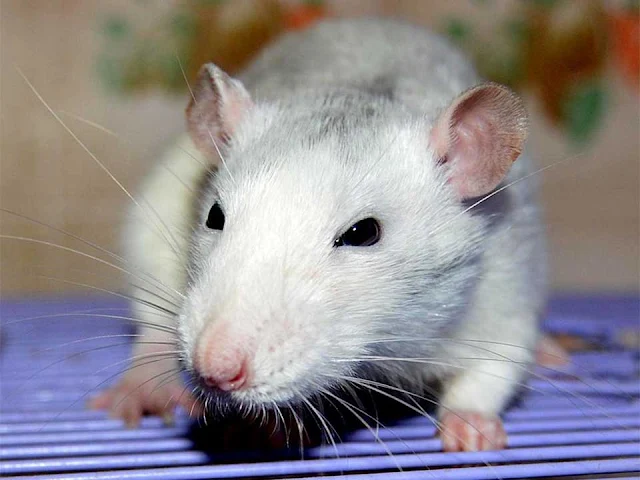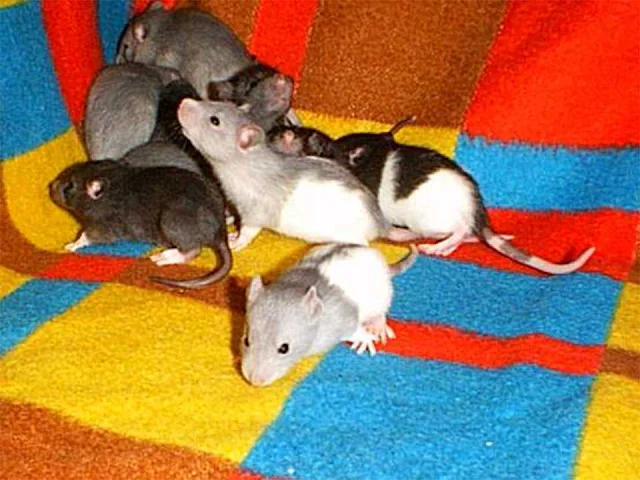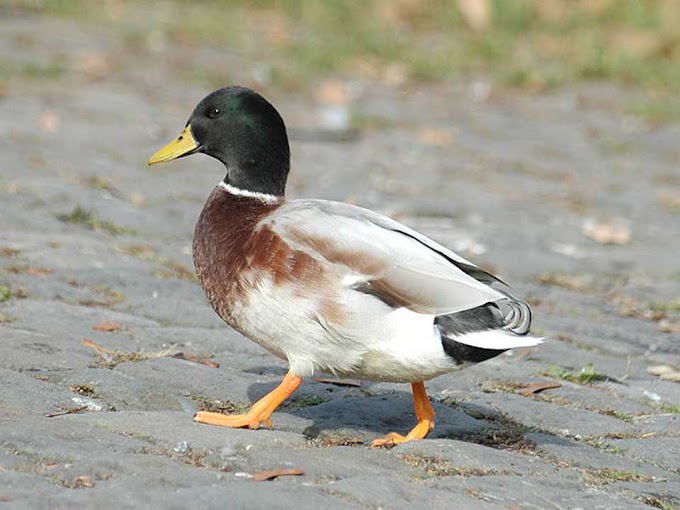Fancy Rat is a very famous breed of “Tame” or “Pet Rat”. The term
“Fancy Rat" comes from the impression of animal fancy to promote domestic
animals. The wild breeds that have become compliant and raised for various groups
still include in the ‘fancy’ breed.
Fancy Rats have their ancestries as the targets for blood-sport
during the 18th and 19th centuries in Europe. Later on, Fancy Rats
were bred as domestic pets and now come in various color and coat varieties.
Fancy Rats are usually sold as pets at the stores by breeders.
Body Type
Two of the most protuberant and consistent physical variations
applied to rats through selective breeding are the expansion of the “Manx” and “Dumbo”.
The Dumbo, whose backgrounds are in the United States, is considered by having big,
little, round ears on the sides of its head, and was known as for similarity to
the fantastic “Dumbo” the Elephant. The Manx Rat is without tail due to a
genetic changes, and was known as for the ‘Manx Cat’, which shares this
feature, though not essentially due to the similar alteration.
Coat Types
There is a comparatively small diversity of coats in relative
to the number of colors and patterns, and not all are worldwide homogenous. The very famous breed is usual or customary, which is permissible alteration in thickness
between the genders; males have a rough, dense, uneven coat, while females'
coats are softer and better. Other consistent coats comprise: rex, in which all
the hairs are wavy, even the mustaches; velveteen, a softer variation of the
rex; satin or smooth coat, which is very soft and adequate, with a shine; and
Harley, branded by thin long straight hairs.
Coloring
Though some pet rats maintain the agouti complexion of the wild brown rat, others have dense colors. The agouti-based colors comprise
agouti, cinnamon, and fawn whereas black-based colors comprise black, beige,
and chocolate.
Eye color is thought to be a subgroup of colors and coat-color
descriptions frequently contain standards for the eyes, as various genetic
factors which control eye color will also affect the coat color. The American
Fancy Rat and Mouse Association (AFRMA) grades black, pink, dark red, and
odd-eyed as possible eye-colors, liable on the range of rat exposed. Ruby denotes
to eyes which at a glance look black but which are on closer remark a deep,
dark-red.
Color names can differ for more vaguely distinct diversities,
like lilac and fawn, while the clarifications of values can vary between the
countries and clubs.
Commonly Recognized Standards
Berkshire. This breed is colored top with a white belly.
Hooded. This breed having saddle
color, a single, continuous line from the full head down the back and perhaps partially
down the tail.
Capped. This breed
contains color on the complete head only.
Blazed. This standard contains
colored head (Capped) or body (Irish, Berkshire or self), with a trilateral a wedge of white-fur over the face.
Variegated. Any form of incompatible, peculiarities in fur. Can be something from a broken or dotted hood or a misshaped glare.
Irish or English Irish. In England, the Irish are consistent by the NFRS as a regular
triangle of white with a side that starts at the chest. In the USA and other
places, clubs such as “AFRMA” differentiate this design as the English Irish
and permit for additional consistent Irish in which the rat may have white of
an even or balanced nature anyplace along its underside.
Hairless Rats
Hairless rats are a coat diversity categorized by changing
levels of hair loss. Hairless Rats, bred from wavy coated rexes, range from
having areas of too little fur to being absolutely bare. Hairless Rats are naturally
bred with diverse groupings of the genes that source ‘Rex Coats’. Since the rex
is a foremost characteristic, there only essentials to be one ‘Rex Parent’ to bred
curly-rex-coated descendants. Nevertheless, when two copies of the characters
are existing, by breeding two rexes combined, the coat is affected contrarily, producing
hairlessness and making the informal name, ‘Double-Rex’.
It is commonly not recommended to keep Hairless Rats outside
of laboratories when they are necessary for research as they are subject to an excess
of health complications, for instance, kidney and liver failure, in addition to
various skin conditions and melodramatically reduced lifespan.
Social Behavior
Usually, rats are quite friendly and function the best with
at least one cage mate. It is commonly unwise to keep a particular rat unless
there are severe social problems, for instance, those that can be perceived in
some matured males. The former rats are familiarized to one another, the better
and often-times, rat breeders will inspire new possessors to take two or more
rats of the similar sex from the similar brood for appetizers.
Mostly with males, there can be little aggressiveness at the start, but once an alpha rat has been dogged, the rats should get laterally
well. Within 2 weeks to one month, the rats will more probably have accustomed
and become sociable with each other. Rats are usually very sociable to other
cage-mates. They occasionally help or take care of other sick-rats.
The course of integrating is relaxed with two rats of young-age,
normally less than 6 months old. The procedure of integrating is very difficult
with two or more male adults, as adult-males are less expected to admit new
cage-mates, particularly after an alpha has been recognized. Unless there is a problem
of mixing rats together, the holders should always retain them in a group of at
least three individuals, as rats live in packs and a pack contains three individuals.


















2 Comments
Nice article! I am very impressed with your Rat Breeds. As the days become hotter, it's important to maintain a comfortable living environment for your pets. Rats do best in temperatures that are comfortable to us humans. Thanks for sharing.
ReplyDeleteThanks for your interest in Rat Breeds. You can also find any other lovely and adorable small pet just right here with complete details and characteristics.
Delete